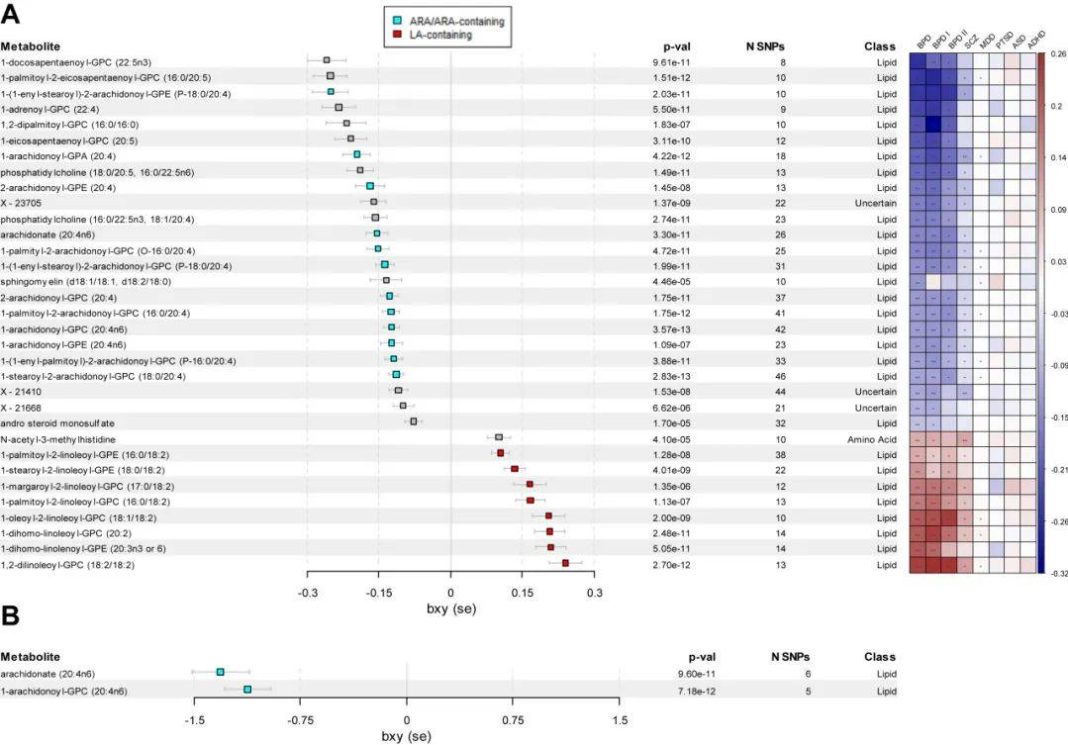Arachidonic acid is an Omega-6 polyunsaturated fatty acid found in eggs, poultry, and seafood. A new study published in the Biological Psychiatry journal on the ClinicalKey medical information platform by Elsevier revealed that individuals with a genetic predisposition for higher levels of arachidonic acid lipid in their circulation have a lower risk of bipolar disorder (click “Read Original Article” at the end for full text). This new evidence paves the way for potential lifestyle or dietary interventions.
Bipolar disorder is characterized by recurrent episodes of mania and depression. Although its exact cause is still unclear, previous research indicates a strong genetic component in bipolar disorder. The results of this study suggest a link between bipolar disorder and changes in metabolite levels, supporting the idea that circulating metabolites play a significant role in bipolar disorder and other mental illnesses.
Lead researcher Dr. David Stacey explained, “Increasing evidence suggests that metabolites play a role in bipolar disorder and other mental illnesses. By identifying metabolites causally involved in bipolar disorder, we hope to highlight potential lifestyle or dietary interventions.”
By applying Mendelian randomization, researchers identified 33 metabolites out of 913 in the blood that are associated with bipolar disorder, most of which are lipids.
Figure 1: The Mendelian randomization of the entire metabolome revealed 33 metabolites significantly associated with bipolar disorder (p < 5.48 × 10 −5).
(A) The figure illustrates the slope (effect size) of the relationship between each of the reported 33 significant metabolites by Surendran et al. and bipolar disorder (see the forest plot on the left), as well as the estimated effects of bipolar disorder and several other mental disorders on two main subtypes of bipolar disorder (Bipolar I and Bipolar II) and other related disorders (see the heatmap on the right).
(B) The figure depicts the estimated effects of two of the 33 metabolites identified in a previous metabolomics study by Shin et al. on the causal relationship with bipolar disorder.
ADHD, attention-deficit/hyperactivity disorder; ARA, arachidonic acid; ASD, autism spectrum disorder; BPD, bipolar disorder; LA, linoleic acid; MDD, major depressive disorder; PTSD, post-traumatic stress disorder; SCZ, schizophrenia; SNP, single nucleotide polymorphism.
The researchers also found that a risk gene cluster (FADS1/2/3) for bipolar disorder encodes enzymes related to lipid metabolism, mediating the association between bipolar disorder and levels of arachidonic acid and other metabolites.
Figure 2: Significant genetic signals for bipolar disorder (BPD) in the FADS1/2/3 cluster show shared genetic etiology with 27 out of the 33 tested metabolites, including arachidonic acid.
(A) The region association plot centered on the FADS1/2/3 loci depicting the signals for BPD (top) and arachidonic acid (bottom). The bipolar disorder sentinel variant rs174592 is shown.
(B) The stacked bar plot of posterior probabilities returned by Coloc for H0 (null variable), H1 (BPD-only causal variable), H2 (metabolite-only causal variable), H3 (two distinct causal variables), and H4 (one shared causal variable). Posterior probability greater than 0.8 for H4 is considered evidence of shared genetic etiology.
Dr. John Krystal, editor of Biological Psychiatry, commented on these findings, stating, “Arachidonic acid is a widespread Omega-6 fatty acid in the body and brain, contributing to the health of cell membranes. This study marks a significant step in developing blood biomarkers for the risk of bipolar disorder, especially in patients with genetic variations in the FADS1/2/3 gene cluster.”
Dr. Stacey pointed out, “Interestingly, we observed a pattern where a genetic predisposition for higher levels of arachidonic acid side chains in lipids is associated with a lower risk of bipolar disorder, while lipids containing linoleic acid show the opposite. As arachidonic acid is synthesized from linoleic acid in the liver, this indicates the importance of the arachidonic acid synthesis pathway in bipolar disorder.”
Due to its presence in breast milk, arachidonic acid is considered crucial for infant brain development and is added to infant formula in many countries. Therefore, it may influence the risk of bipolar disorder by affecting neural development pathways, aligning with the contemporary view of bipolar disorder as a neurodevelopmental disorder. Arachidonic acid can be directly sourced from meat and seafood products or synthesized from dietary linoleic acid found in nuts, seeds, and oils.
Dr. Stacey concluded, “To our knowledge, our study is the first to emphasize the potential causal relationship between arachidonic acid and bipolar disorder. To ascertain the preventive or therapeutic value of arachidonic acid supplements, further preclinical studies and randomized controlled trials are necessary. We particularly focus on individuals with compromised arachidonic acid synthesis pathways or poor natural dietary sources. Our results also support the potential of targeted health interventions focused on early-life nutrition to ensure infants and children receive adequate arachidonic acid and other polyunsaturated fatty acids for optimal brain development, which may also reduce the risk of bipolar disorder.”


